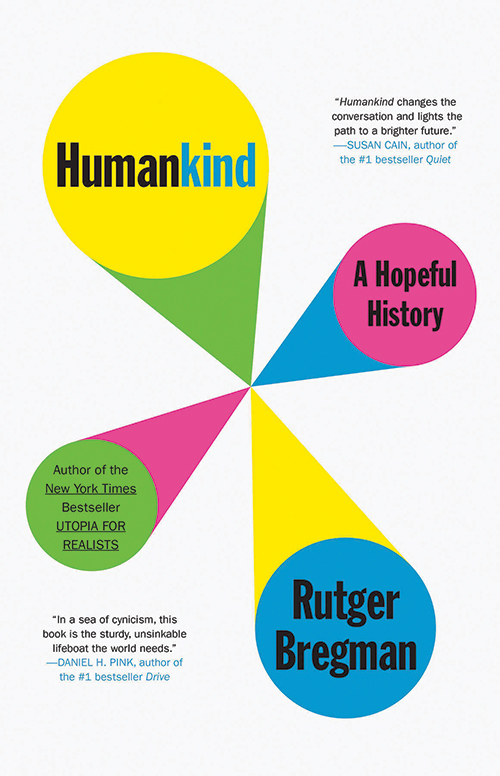
Humankind: A Hopeful History
Reviewed by Bruce Hawkins
November 1, 2020
By Rutger Bregman. Translated from the Dutch by Erica Moore and Elizabeth Manton. Little, Brown and Company, 2020. 480 pages. $30/hardcover; $18.99/paperback; $15.99/eBook.
Humankind examines human experience and arrives at George Fox’s conclusion that society can be built on the foundation of respect for (that of God in) every person. In Bregman’s words, “to stand up for human goodness is to take a stand against the powers that be.” His examination of evidence that humans are fundamentally depraved finds that theory built on sand, scientific malfeasance, colonialist fake news, and journalistic sensationalism. His view of history is that millennia ago, humankind fell into the honey-trap of the fertile floodplain between the Tigris and the Euphrates Rivers, where crops grew without much effort. When the climate turned against them, this led to agriculture, armies, and kings, and reduced most of the population to misery. Only in the last two centuries have we begun to escape, bringing on the problem of expanding beyond the capacity of the earth to sustain us.
Bregman spends some time examining how civilization goes wrong. It isn’t that we choose the wrong people to lead us but that the act of leadership, the exercise of power, corrupts. Studies of powerful people show them less able to relate to others. Confident in their own superiority, they don’t listen. And as leaders, they conduct war from a distance, where they don’t have to see or experience the suffering. Those who continue to listen, as my own state senator and representative in Boston, Mass., do, remain humane and effective at bringing change.
There is another model: “participatory budgeting,” where ordinary citizens take part in the budgeting process. This has been used successfully in cities in Brazil, Venezuela, and even the United States (New York City among them), but we don’t hear about it. Humans function better in smaller groups, and the best remedy for prejudice is human contact. The history of same-sex marriage shows how powerful acquaintance is; as people discovered that they had LGBTQ friends, acceptance grew far more rapidly than any of us expected.
Norwegian society gets good results by replacing the self-fulfilling prophecy of human depravity with that of human excellence. Norway’s humane treatment of prisoners—which has been replicated in North Dakota—results in dramatically lower recidivism.
Even armies and terrorist groups function more effectively when relying upon group solidarity instead of ideology. For instance, “Nazi generals went to great lengths to keep comrades together, even withdrawing whole divisions for as long as it took new recruits to form friendships.”
Bregman is no Pollyanna, however. He has a long discussion of the way in which empathy misleads us, being “the mechanism that makes us both the friendliest and the cruellest species on the planet. The sad truth is that empathy and xenophobia go hand in hand.” His preferred alternative is compassion, which does better with multitudes.
In conclusion, Bregman argues that a better world can come from knowing ourselves better, but it will take work. “A better world doesn’t begin with me, but with all of us, and our main task is to build different institutions.”
Bruce Hawkins is a founding member of Northampton (Mass.) Meeting; has been a Friend for 55 years; and has served on committees at Friends General Conference and local and yearly meeting.


